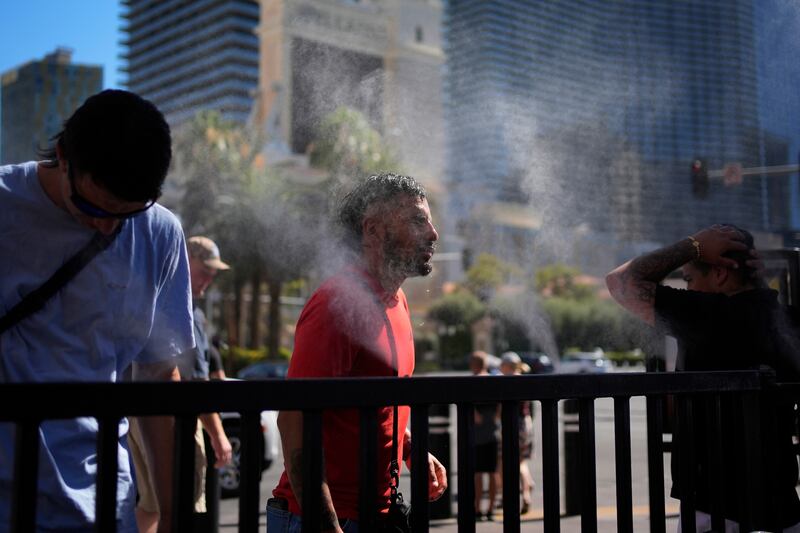Welcome back to the heat dome.
Temperatures continue to broil across the Western United States as another heat dome settles over Utah, Nevada, California, Arizona, Idaho, Oregon and Washington, according to the National Weather Service.
“Dangerous heat remains in the west for the (rest) of this week and is expected to spread eastward over the weekend and early next week,” the National Weather Service wrote on X on Tuesday. “The persistent and record-breaking heat is extremely dangerous to those without access to cooling.”
Extreme temperatures put more than 144 million Americans under heat alerts, per Heat.gov. Roughly 1 in 5 Americans are currently under heat advisory.
Extreme heat persists in the West
June 2024 was the 13th consecutive month to break global heat records, reported The Associated Press. Global temperatures are 2.7 degrees Fahrenheit warmer on average than than pre-industrial times.
Extreme temperatures across the West are crushing records. During the past week, heat records were shattered in these Western cities (per The Washington Post):
- Las Vegas: 120 degrees
- Palm Springs, CA: 124 degrees
- Parker, AZ: 124 degrees
- Laughlin, NV: 120 degrees
- Phoenix: 118 degrees
- Sacramento: 112 degrees
- Medford, OR: 112 degrees
The West was scorched by a heat dome in early June, as the Deseret News previously reported. Excessive temperatures are forecasted to persist in the coming weeks thanks to the arrival of another heat dome, per KSL News.
“Summer temperatures, on average, will be hotter than normal from New England through the Atlantic Corridor, in Florida and the Deep South, through Texas and the Midwest, and on to California,” The Farmer’s Almanac forecasted for summer 2024.
What is a heat dome?
Heat domes drive up temperatures by trapping hot air beneath a high-pressure atmosphere, per the U.S. Department of Agriculture. The pressure system can block winds and clouds from forming within the dome, resulting in stagnant heat.
“The heat dome can stretch over several states and linger for days to weeks, leaving the people, crops and animals below to suffer through stagnant, hot air that can feel like an oven,” per Scientific American. “A heat dome can have serious impacts on people, because the stagnant weather pattern that allows it to exist usually results in weak winds and an increase in humidity.”
In the summer of 2021, an intense heat dome in the Northwest pushed temperatures into the triple digits. Hundred of people died across the Northwest during the heat dome, many of which were at home without air conditioning, per Oregon Public Broadcasting.
How can you stay safe in the heat?
Extreme heat claims more lives than tornados, floods and hurricanes combined, reports Scientific American. July 2023 was the hottest month ever observed on Earth, according to a report from The World Meteorological Organization.
More than 2,300 people died from excessive heat in 2023 — the greatest amount in 45 years, according to The Associated Press. Following record-breaking temperatures in June, summer 2024 is stacking up to be even hotter than last year.
According to Heat.gov, heat-related illness and death is typically preventable through, “proper planning, education, and action.”
How can you stay safe in excessive heat? Here are tips from the National Weather Service.
- Slow your pace: During bouts of extreme heat, take it easy. Reduce, eliminate or reschedule exercise or strenuous activities to the coolest hours of the day.
- Dress light: Wear loose-fitting, lightweight clothing. Wear light-colored clothes to reflect heat.
- Stay hydrated: Drink lots of water, even if you don’t feel thirsty. The average adult needs four to six cups of water per day, according to Harvard Health. Avoid alcoholic and caffeinated beverages.
- Use air conditioning: Keep your home cool with air conditioning. If you do not have access to air conditioning, spend time in public, air-conditioned places such as libraries and malls.
- Cut back on sun exposure: Avoid direct exposure to the sun. Sunburns make is difficult for the body to dissipate heat. Take cool showers or baths if burnt.
- Watch over the vulnerable: Infants, children, elderly and disabled adults are especially vulnerable to extreme heat. Never leave infants, children, pets or others in the car.


